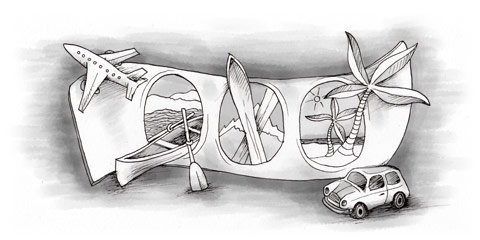If you drive anything other than a worthless heap, you should have theft insurance that includes personal effects. It’s particularly important to protect your car if you own a model that’s desirable to car thieves, e.g. most new sports and executive cars, which are often stolen to order by professional crooks. In Provence and on the Côte d’Azur stolen cars often find their way to Africa and may already be on a ferry by the time the owners report them stolen.
It’s wise to have your car fitted with an alarm, an ignition disabling system or other anti-theft device, plus a visible deterrent, such as a steering or gear lock. Even a good security system won’t stop someone breaking into your car (which usually takes most thieves a matter of seconds) and may not prevent your car being stolen, but it will at least make it more difficult and may persuade a thief to look for an easier target.
When leaving your car unattended, store any valuables (including clothes) in the boot or out of sight. Never leave the key in your car, even when you’re paying for petrol, and never leave your original car papers in your car, even if you have copies. If possible avoid parking in long-term car parks, as these are favourite hunting grounds for car thieves. Foreign-registered cars, particularly camper vans and motorhomes, are popular targets, particularly when parked in ports. When parking overnight or when it’s dark, parking in a well-lit area may deter thieves.
If your car is stolen or anything is stolen from it, report this immediately to the police in the area where it was stolen. You can report by telephone but must go to the station to complete a statement. Don’t, however, expect the police to find anything or even take any interest in your loss; of the 250,000 vehicles stolen each year, only
around two-thirds are recovered. Report a theft to your insurance company as soon as possible.
Highway Piracy
Highway piracy ( les pirates de la route) is an increasing problem in some areas, where foreign drivers are often targets. Gangs deliberately bump or ram cars to make drivers stop, usually late at night when there’s little traffic about. A driver may also pose as a plain clothes policeman and try to get you to stop by flashing a fake badge or setting up a bogus road block. In the worst cases, thieves take not just the car and its contents, but even the clothes the victims are wearing. Travelling at night is becoming increasingly hazardous and should be avoided if possible.
This article is an extract from Living and working in France. Click here to get a copy now.


